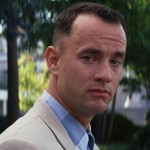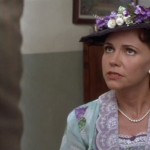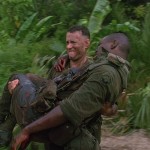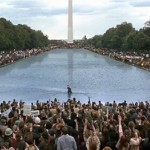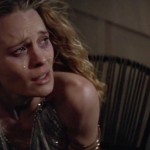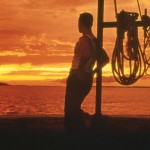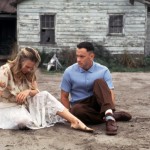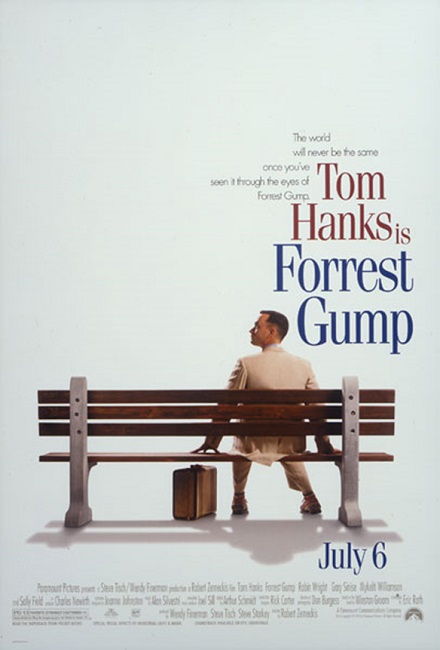
Forrest Gump – 1994
Oh my goodness! This was such a great film. This is one of those movies that I could watch over and over again and not get bored. I have seen it many times, and watched it again for this review. Each time I see this movie, I find something new. The casting was spot-on, the acting was wonderful, the epic scope of story was incredible, the costumes were great, the music was gorgeous and the emotional content was poignant.
Tom Hanks, of course, carried most of the film, though other great actors like Robin Wright, Gary Sinise, Sally Field and Mykelti Williamson made up the supporting cast. Hanks turned in an excellent performance, creating a very unique and memorable character. He really showed off his versatility as an actor. I have never much seen Hanks as an action hero. His early career was mostly comedies, though later her turned more towards dramas. But even the action sequences in Vietnam were done quite well. This was the second year in a row that Hanks won the Award for Best Actor. The previous year he had taken home the Oscar for his role in Philadelphia.
Forrest Gump was a man with below average intelligence who is aware that he is not smart. He had a southern drawl and a conservative manner. He was unfailingly honest, completely loyal to his friends and family, polite, hard-working and just an all-around good guy. I look at the story as a fantasy that is based in reality. Over the course of his charmed life he takes part in or is present at, many significant events that took place in the United States during the 60s, 70s and 80s. He also meets a number of important historical figures. I call this movie a fantasy because while it is possible that one man could have done all the things that the character of Forrest Gump does, it is improbable that one man could have all the remarkable experiences depicted.
Interesting note: In addition to the events portrayed in the movie, the original novel on which the movie is based features Gump as an astronaut, a professional wrestler, and a chess player.
So while the plot is not entirely realistic, it is a very good fantasy. It is basically a good vehicle to explore those decades that had such a huge influence on the world. The events that took place, the social movements, the music and the historical figures all had a hand in shaping the world as we know it today. We see history unfold through the eyes of Forrest Gump whose character, due to his slowness, is a blank slate or sounding board. He sees events through the eyes of innocence, letting us remember for ourselves, allowing us to form our own opinions. Hanks was incredible in his portrayal. He really pulled off that innocence well.
Opposite Hanks was Robin Wright, playing the part of Gump’s one and only love, Jenny. While Gump represented the conservative side of society, joining the military, fighting in the Vietnam War, working hard to earn a living, and living a quiet life, Jenny represented the liberal side, embracing the counter-culture lifestyle, becoming a hippie, using recreational drugs and engaging in sexual promiscuity. It would be easy to say that the film had a pro-conservative political agenda, though the filmmakers claimed that no such agenda existed. I prefer to take them at their word. If there was any agenda to be perceived, it is only because the movie was told through the perspective of Gump and not Jenny. I thought both sides were equally represented.
Jenny was a wonderfully complex character. She had been sexually abused by her father at a very young age and that trauma affected her entire life, her personality. Many of the bad decisions she made stemmed from that abuse, her damaged self-esteem, and her self-loathing. It wasn’t until the end, when her wild lifestyle gave her a death sentence, that she stopped punishing herself for what happened, and started blaming her father. Wright was phenomenal. The scene where she nearly commits suicide is awesome and frightening one to watch.
Gary Sinise was also a stand-out member of the cast, playing Lieutenant Dan, and he had more than just the challenge of performing a complex role. His character loses both of his legs in Vietnam and so he had to work with the special effects department to convincingly create that innovative illusion. It was around this time that good CGI (computer generated imagery) was starting to take hold and look believable. And it is used in subtle ways that you wouldn’t even notice if you didn’t know what to look for. Sinise did a wonderful job and was very believable as someone who was faced with his crippling disability. He had some very dramatic moments which he handled very well.
Sally Field, playing the part of Forrest’s mother, did well, as you might expect and Mykelti Williamson, an actor who has a familiar face, but not a familiar name, also did a great job as Gump’s friend in the army. His stand-out feature was his protruding bottom lip, which was done with a gum implant. Both of these characters had their own death scenes to play and each one succeeded in bringing me to tears.
Another actress in a pretty minor role that I have to mention is Marla Sucharetza, playing Lenore, a slutty party girl Gump meets in New York. She is shown to be frivolous and air-headed, but she has a strange and somehow beautiful moment in a single line she delivers. I’m not sure if it is what she says or how she says it, but the line strikes me as vaguely haunting and very telling of her character. While still in party mode, she says, “Don’t you just love New Year’s? You can start all over.” But then she turns suddenly very serious and introspective, saying, “Everybody gets a second chance.” In that one line, I always hear a sad hollowness and a longing that is somehow heart-wrenching. I’m not sure why, but I have to give Sucharetza a special nod for a job well done.
The cinematography was also very well done, especially in the sequence when Forrest is describing the beauty of the places he has seen to Jenny. He seems to have led a charmed life, while she seems to have lived a cursed one. As he describes those times in his life to her, beautiful images of an amazing sunset in the desert, a crystal clear mountain lake reflecting a deep blue sky, and the stars over the Vietnam jungle are shown. She says, “I wish I could have been there with you,” to which Forrest replies, “You were.”
You see, Forrest loved Jenny with a pure and unconditional love. He thought of her often and wanted nothing for her except happiness. She was his angel, no matter what she did or where she went. In the end, they have a son together and then get married. But the marriage is short lived because Jenny dies of AIDS. The film never actually named her illness, but made it pretty clear. In this way, Forrest becomes a father to Forrest Jr., played by Haley Joel Osment who looked like he was no more than 4 years old at the time. The biggest tear-jerking scene was the moment where Forrest is standing over Jenny’s grave, talking to her and trying not to cry. “I miss you, Jenny.” Ugh! Tear my heart out!
The special effects in the movie were revolutionary for the time. Several unique things were done that had never been done before. First the image of Tom Hanks was inserted into old archival footage. For example, in one scene, he is in a black and white newsreel where he is telling JFK that he has to pee. Kennedy laughs and says, “I believe he said he has to go pee,” before walking away. Another scene shows him having a Congressional Medal of Honor placed around his neck by LBJ. Another scene shows him on an interview panel with John Lennon.
These scenes were all done by filming Tom by himself, and compositing his image into the archival footage. This generally worked very well, except for one scene: the scene in which Gump shows up beside Governor Wallace. This must have been their first attempt at this kind of special effect, because he doesn’t seem to fit as well into the picture as he does in other scenes with the same effect. Also, he is supposed to be part of the background in the scene, as if he is a bystander who happened to be present when the news cameras were rolling. But he was bouncing around and drawing too much attention to himself, making himself the focus. His image also seemed too bright to blend into the darker original footage.
Another thing the special effects people did to those scenes was to morph the mouths of the historical figures, making JFK, LBJ and Lennon speak to the fictional character of Gump. I remember the first time I watched this movie in 1994. I was amazed and it all looked so real. But in watching it again, I have to admit that I am spoiled by modern technology. The movement of the mouths didn’t always match up very well with the words, especially in the case of Lennon. I believe they could do it better today.
Interesting note: Dick Cavett actually played himself in the archived footage. The set for the Dick Cavett show was recreated and the real Cavett was given a make-up treatment that made him look younger so that he could play himself.
Now, I would be remiss if I didn’t mention the music. The soundtrack for the film was incredible! Alan Silvestri provided a full orchestral score that was just beautiful, capturing the innocence of Gump’s character and really enhancing the visuals of the movie. But in addition to that, music from the 60s, 70s and 80s was used. I think we can all agree that a decade can be easily defined by its music. Songs that people from my generation know and recognize, instantly take us to a specific time in history. When the credits were rolling, I counted. There were a total of 57 songs that were used in the film, not counting Silvestri’s score.
Artists like Elvis Presley, Fleetwood Mac, Credence Clearwater Revival, Lynyrd Skynyrd, The Birds, The Doors, Jimi Hendrix, The Mamas & The Papas, Simon & Garfunkle and Bob Seger were included on the official soundtrack, though mostly snippets of their music were actually used in the film. But it is music great that audiences know and love, and automatically associate with certain periods in history.
Forrest Gump was a wonderful and unique movie that had an incredible story, appealing to my love of epics. The fantastic cast of actors really stepped up to the plate and turned in some awesome performances, making this a very worthy winner of the Best Picture award. In addition to the Award for Best Picture, Forrest Gump took home Oscars for Best Actor (Hanks), Best Director (Robert Zemeckis), Best Visual Effects, Best Adapted Screenplay and Best Film Editing. Great job everyone!
